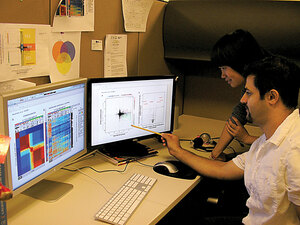Grant allows center to create cancer database
A multimillion-dollar grant recently awarded by the National Cancer Institute will allow USC to launch a large-scale project to compile genetic data from cancer patients in hopes of sparking more efficient cancer research.
The USC Epigenome Center, located on the Health Sciences Campus, was awarded a $10.4-million grant to work with five other institutions on a database for the next five years.

Mining data · Hui Shen looks on as Houtan Noushmehr (right) examines data. Both are Ph.D. students working with the Epigenome Center. - Dieuwertje Kast | Daily Trojan
“It’s thrilling to be part of an international contortion for what will be a major resource in cancer research for many years to come,” said Peter W. Laird, director of the Epigenome Center.
Researchers have been compiling genetic data from cancer patients for decades, but the data had not been coordinated into one database until now, Laird said.
The money from the grant will allow the Epigenome Center to analyze genetic data and contribute the analysis to The Cancer Genome Atlas, a long-term project funded by the NCI. The goal of the project is to bring together data of molecular changes in more than 500 different samples of tumors and tissues from each cancer type and will form a comprehensive atlas.
“Before TCGA, many scientists studied a small number of genes in a single experiment and often performed their work on a small number of samples,” Renate Myles, an NCI spokeswoman, wrote in an email. “With this new set of grants, one of which went to Dr. Laird, the National Institutes of Health will be sponsoring a project that will look at all the genes, all the DNA in 500 tumor samples of every type of cancer the project studies.”
In particular, USC will use the grant to join John Hopkins University in collecting and analyzing data to map molecular changes in 20 main types of cancer, including breast, brain and ovarian cancer.
“It’s sort of like writing an encyclopedia of molecular cancer. It’s really an atlas for other investigators all over the world to use the molecular data,” Laird said.
The project will also involve graduate students at USC, giving them a chance to conduct research as well as access to data analysis and lab experiments that could have a national impact.
“This is a very exciting project — it’s very cutting edge. We are exposed to a very collaborative environment where we can share our ideas with many other scientists across the nation,” said Houtan Noushmehr, a Ph.D. student studying genetics, molecular and cell biology who is taking part in the project. “Our rich pool of data allows us to embrace a field of science that not a lot of students and scientists have access to.”
According to Laird, progress in the field through projects like TCGA will have vast implications for the prevention and treatment of cancer and other diseases. In some cases, doctors could even use the data from the project to identify patients with specific types of cancer that might respond better to different treatments.
Once the research is processed, the database will be available for public access which, Laird said, could become a crucial source for cancer researchers to diagnose, treat and prevent cancer.
“This will provide the most comprehensive map of molecular changes ever in place for cancer, and that information will help design new drugs and much more targeted therapy with less side effects,” he said.
